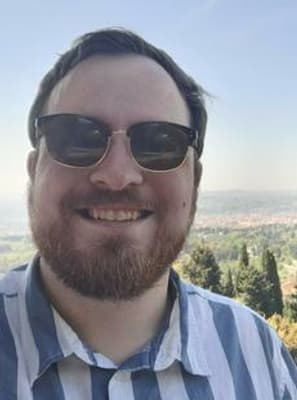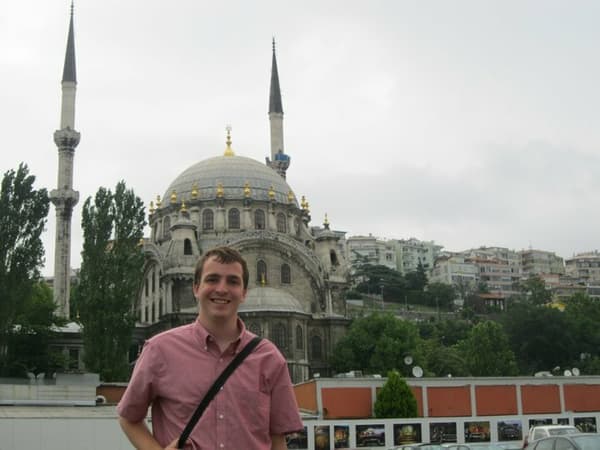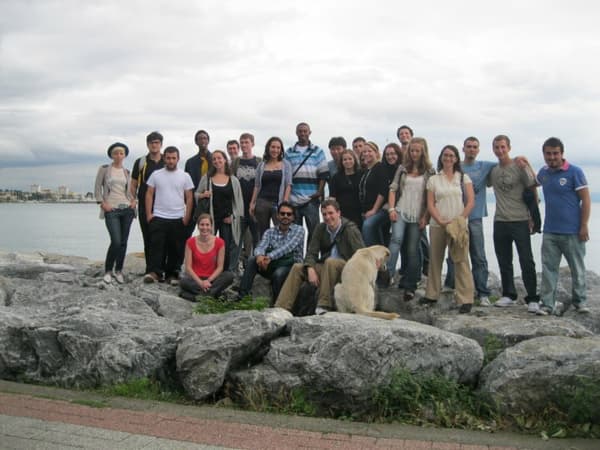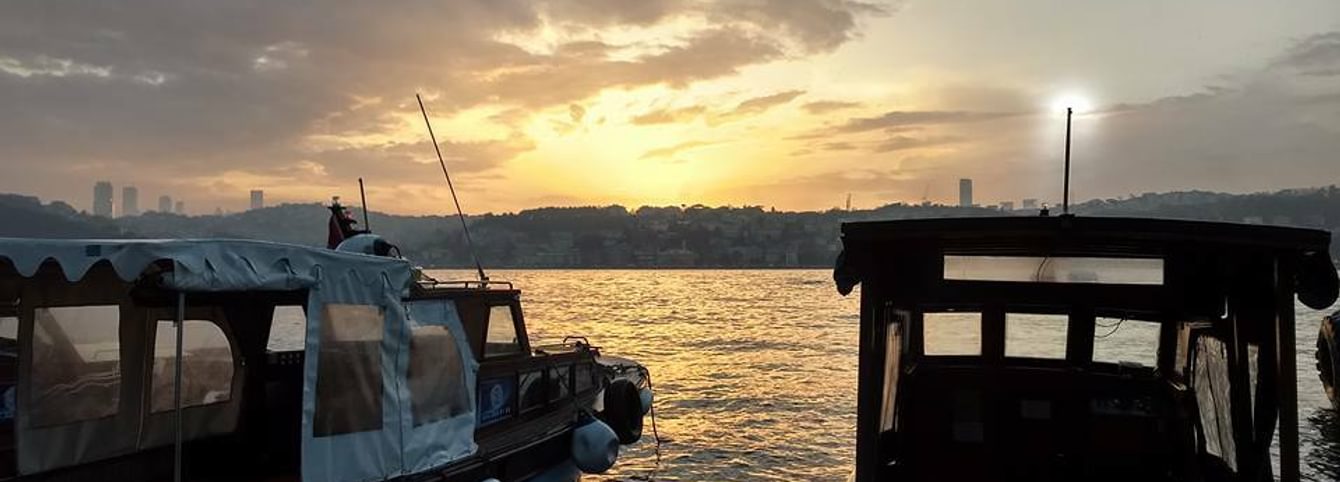
Meet CLS Advisor, historian, and 2010 CLS Turkish alumnus—Tyler Kynn! Tyler is an Associate Professor of History at Central Connecticut State University where his research centers on Islam, the pilgrimage to Mecca (hajj), and Ottoman sovereignty and power in Arabia. Tyler also explores the intersection of digital history and gaming and co-created The Hajj Trail, a digital simulation of the seventeenth-century hajj journey.
Senior Communications Officer Rori DiFiore had the opportunity to catch up with Tyler on his pursuits thirteen years post-CLS. In this interview, Tyler speaks about the importance of critical language study for those pursuing careers in history and academics. He gives thoughtful advice to fellow CLS advisors and upcoming CLS participants, and shares how his CLS Turkish Program has continued to impact his life after over a decade.
Rori DiFiore: I wanted to start off by asking you where did your interest in Turkish begin?
Tyler Kynn: I was in my sophomore year as an undergraduate at the University of Minnesota studying history and was interested in the Ancient World. I’d planned to study Turkish so I could one day travel to archaeological sites in Turkey for fieldwork. Over the course of my undergraduate career, my interest in the ancient world developed into a fascination with a more recent history, the history of the Ottoman Empire and with that a need to learn Turkish to further my research.
I always felt I needed an immersive experience to solidify my Turkish language which led me to CLS. When you are surrounded by the language, you’re forced to be in embarrassing situations where you conjugate things wrong and make mistakes, which is essential to the learning process. When you pick up a language in class at a university stateside, you often stay at the level you are already at. It's when you go into an immersive and intensive program that you actually improve. Participating in CLS in 2010 was a fantastic opportunity. Afterwards, I immediately participated in a year-long study abroad in Turkey. CLS was absolutely foundational.
RD: I was wondering if/how any of your experiences on CLS in Istanbul helped develop your interest in Islamic history in particular and Hajj? If there is anything you’d like to add about your current research here, please feel free to!
TK: While in Istanbul for CLS, being surrounded by Ottoman history in the city that was the empire’s former capital definitely invigorated my own interest and the study of the Ottoman World. Our CLS site would take us on field trips in the city to various historical sites and at other times other members of my CLS cohort and I would go on historical excursions on our own to nearby historical cities like Edirne and Bursa. These experiences not only shaped my interest in the Ottoman past but also with an interest in this history of travel and the traveling experience which through a long and winding road led me to my current research on the Ottoman Hajj and the history of travel in the early modern Islamic World.
RD: How has speaking a critical language served you in your career?
TK: As an assistant professor of history particularly focused on the history of the Ottoman Empire, I use Turkish on a day-to-day basis. I often read academic books written in Turkish or explore the National Archives in Turkey to get an understanding of a topic I am writing about. I always tell students interested in the history of a particular region to zone in on the language spoken there. During my studies whether my master’s degree in Budapest Hungary at Central European University, or my PhD at Yale University, I would often hear the refrain, “If you want to study the history of another part of the world, you need to know these languages.” If you are interested in continuing your academic pursuits, speaking a critical language gives you a huge one up in the application process.
You need language acquisition to be able to read sources, to tell stories and histories of other parts of the globe, especially from a comparative perspective. CLS being at the kickstart of that entire process was very foundational to where I am today. Whatever career path you pursue, you have this unique language that can now connect you to a very large part of the globe.

RD: Why do you think others should consider learning Turkish?
TK: Turkey is a country where the proficiency of English speakers is quite low. There are tens of millions of Turkish speakers in Turkey and all over Europe who don’t have English language skills. This shows that there is a need for native English speakers to learn Turkish and act as a bridge.
Turkish is a foundational language to know if you want to study politics and international relations of Central Asia. Turkish is also foundational because it is the chief language of the Turkic language family. Turkish is not just important to internal Turkish politics and national relations; it has a very large role to play in the Turkic speaking world and in the broader Middle East.
RD: Why are opportunities like CLS important to students at Central Connecticut State?
TK: CLS provides an opportunity for students to study critical languages that they might not otherwise because of financial barriers. At Central Connecticut State University, many of our students are first generation and without fully funded opportunities like CLS, study abroad might not be possible for them. Beyond language learning, studying abroad expands one’s worldview and sense of self. I encourage all my students to consider opportunities that will lead to this expansion. Traveling and studying abroad will take them in directions that they never thought possible. In my case, I went in wanting to be a historian and I ended up becoming a historian—that’s rarely the case. Many people I know studied abroad, had a transformational experience and shifted directions completely.
There are few universities in the country that teach critical languages. The fourteen languages offered through CLS cover a large swath of human existence. CLS offers a rare opportunity—an intensive language environment where you can get a year’s worth of study in eight-weeks.
RD: What advice would you give to other CLS advisors?
TK: I would say that when a student comes in and says they want to learn a particular language; listen to them but then give them two or three other options. A student comes in with their own imagination of what is possible and what they think is relevant in their academic pursuits.
There are many ways in which different languages offered by CLS can be very relevant to what they're doing, they just haven't considered that exact perspective or that angle. That's where we come in.
RD: As an alumnus of CLS, what words of advice do you have for finalists preparing to depart for the 2023 Program?
TK: Trust yourself. You are good enough, you're smart enough. There are going to be difficulties in language acquisition, but you can get through it. You’ll find an amazing amount of kindness from other people when you go abroad. The camaraderie of your cohort will keep you supported and grounded. Don't be afraid to embarrass yourself in conjugating incorrectly.
During my CLS, five of us went on a weekend day trip from Istanbul which involved taking a ferry across the Bosphorus. On the way back, we hit traffic because of a Turkish election campaign and missed our ferry. We were at the ferry terminal until 1 AM trying to convince the staff there to give us tickets to catch the last ferry back.
It was a situation where you had to put yourself out there knowing you were going to make mistakes. Don’t be afraid to make mistakes, because that’s what everyone is going to do and that’s the bread and butter of picking up a language.
RD: It’s been over 13 years since your CLS Program. Are you still in touch with any of your cohort mates?
TK: I’ve been back to Istanbul several times since my CLS Program. I did graduate work there and two other programs studying Ottoman Turk over there. I’ve seen many of my cohort mates throughout the years. We’ve kept in touch, and they’ve gone on to do fascinating things. One of my cohort mates, Nico, is a brilliant linguist and became a translator for the video game Age of Empire providing their voiceovers for countries in Central Asia. Another cohort member decided to go a different direction and eventually decided to become an organic farmer and is also living a beautiful life. There are all sorts of directions people went in after CLS, and I hold close the friendships that I made even many years down the line.

Advisor Chat was created to highlight the perspectives of our advisors and showcase the important work they do to make the CLS Program possible. Are you a CLS advisor who would like to be featured in an upcoming Advisor Chat? Email Communications Officer, Rori DiFiore at clsadvisors@americancouncils.org.


